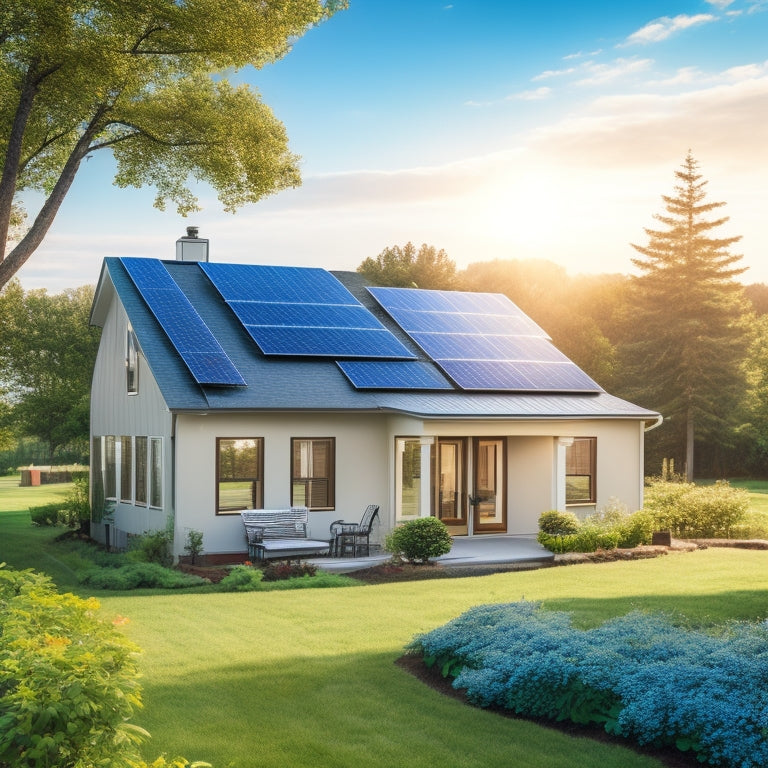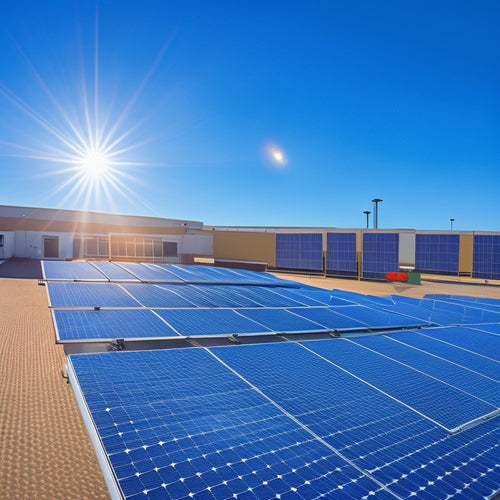
Renewable Energy for Home Appliance Freedom
Share
You're taking a considerable step towards energy independence by considering renewable energy for your home appliances, effectively breaking free from the grid's constraints and embracing a cleaner, more sustainable future. Solar energy, a clean and renewable power source, can greatly reduce your carbon footprint and energy costs. By evaluating your daily energy requirements, prioritizing essential appliances, and choosing the right solar panels, you can utilize the sun's energy potential. With the ability to store excess energy efficiently, you'll be well on your way to maximizing energy independence, and as you investigate these options further, you'll uncover the keys to revealing true freedom from the grid.
Key Takeaways
- Assess daily energy requirements to design an optimal solar panel system, prioritizing essential appliances like refrigeration and lighting.
- Choose the right solar panels by evaluating efficiency, daily energy usage, and roof space, considering energy needs, budget, and available space.
- Implement energy-efficient upgrades throughout the home, replacing incandescent bulbs with LEDs and installing low-flow showerheads and energy-efficient appliances.
- Store excess energy generated during the day with batteries, such as Lead-Acid, Lithium-Ion, or Nickel-Cadmium, for low sunlight periods or nighttime use.
- Regular maintenance of solar panels ensures peak energy output and longevity, reducing reliance on fossil fuels and moving closer to off-grid living.
Harnessing Solar Energy Potential
You can tap into the sun's immense energy potential to power your home appliances, reducing your reliance on fossil fuels and lowering your carbon footprint.
By installing solar panels, you can utilize solar energy innovations that convert sunlight into electrical energy. To guarantee a well-designed system, it's vital to assess daily energy requirements and prioritize essential appliances like refrigeration and lighting.
Regular solar panel maintenance is significant to guarantee peak energy output. This involves inspecting the panels for debris, cleaning them periodically, and checking for any damage or malfunction.
Proper maintenance will assure a consistent flow of energy and extend the lifespan of your solar panels. With the right system in place, you can enjoy a sustainable and environmentally friendly way to power your home appliances.
Benefits of Solar-Powered Appliances
With solar-powered appliances, your carbon footprint shrinks greatly, and your reliance on fossil fuels dwindles.
You'll notice a significant reduction in your environmental impact, as solar energy is a clean and renewable source of power. This shift away from traditional energy sources also leads to substantial cost savings.
By integrating solar energy, you can decrease energy costs and avoid peak-hour pricing, ensuring predictable budgeting. You'll see a decrease in your energy bills, as solar-powered appliances are highly efficient and require minimal maintenance.
Additionally, solar-powered appliances often come with extended warranties, providing you with added peace of mind.
Choosing the Right Solar Panels
Solar panel selection is an essential step in utilizing the power of solar energy for your home appliances.
You'll need to evaluate panel efficiency, which affects how much energy your system produces per hour of sunlight. Higher efficiency panels generate more power per unit area, but are typically more expensive.
When sizing your solar panel system, be sure to analyze daily energy usage and roof space to guarantee you're getting the right fit for your home. Additionally, examining your roof's orientation is critical, as south-facing roofs are ideal for energy output.
There are three main solar panel types: monocrystalline, polycrystalline, and thin-film. Monocrystalline panels offer high efficiency but are pricey. Polycrystalline panels are more affordable and still efficient. Thin-film panels are the most budget-friendly but have lower efficiency.
Evaluate your energy needs, budget, and available space to choose the right solar panel type for your home.
Storing Excess Energy Efficiently
Energy storage is an essential component of a solar-powered home, as it allows you to make use of excess energy generated during the day for use during periods of low sunlight or at night. This excess energy is stored in batteries, which have undergone significant advancements in recent years. Advances in battery technology have led to more efficient and cost-effective energy management.
| Battery Type | Capacity | Depth of Discharge |
| Lead-Acid | 200-400 Ah | 50% |
| Lithium-Ion | 100-300 Ah | 80% |
| Nickel-Cadmium | 150-300 Ah | 60% |
| Nickel-Metal Hydride | 100-200 Ah | 70% |
| Flow Battery | 100-500 Ah | 90% |
When selecting a battery, consider factors such as capacity, depth of discharge, and lifespan to guarantee efficient energy management.
Maximizing Energy Independence
You've invested in a solar-powered home and efficient energy storage system, but now it's time to take the next step: maximizing your energy independence.
To achieve this, focus on implementing energy efficient upgrades throughout your home. Replace traditional incandescent bulbs with LEDs, install low-flow showerheads, and upgrade to energy-efficient appliances.
These upgrades will minimize your energy consumption, allowing you to rely less on the grid. As you reduce your energy dependence, you'll move closer to off-grid living.
With careful planning and execution, you can enjoy the freedom and security that comes with being energy independent.
Frequently Asked Questions
Can I Use Solar Power for My Entire Home, Not Just Appliances?
You can definitely power your entire home with solar energy, leveraging whole home systems that utilize the benefits of solar energy, providing a reliable and clean source of electricity to meet your daily energy needs.
How Do I Maintain and Clean My Solar Panels Properly?
You'll guarantee optimal solar panel performance by implementing regular solar panel maintenance, including inspecting for debris and damage, and utilizing gentle cleaning techniques, such as soft-bristled brushes and distilled water, to remove dirt and grime.
Are Solar-Powered Appliances Compatible With Existing Outlets?
You'll find that most solar-powered appliances are compatible with existing outlets, as they convert DC power to AC through an inverter, ensuring efficient energy conversion and seamless integration with your home's electrical system.
Can I Install Solar Panels Myself, or Do I Need a Professional?
You can attempt a DIY installation, but it's essential to take into account safety concerns, such as electrical shock and roof damage risks, before deciding whether to hire a professional, who can guarantee a safe and code-compliant setup.
Do Solar Panels Work During Power Outages or Grid Failures?
Imagine a lifeline during a blackout: your solar panels, connected to a battery storage system, keeping your lights on while the grid is down. You'll maintain grid independence, as your panels continue generating power, stored for when you need it most.
Related Posts
-

Smart Home Thermostats to Revolutionize Your Space
Smart home thermostats revolutionize your space by providing precise temperature control and optimizing energy saving...
-

Essential Hiking Lights for Safety and Fun
When you're hitting the trails, essential hiking lights are vital for safety and fun. A lightweight headlamp offers h...
-

Essential Solar Panel Mounts for Commercial Properties
When it comes to essential solar panel mounts for your commercial property, durability and wind resistance are key fa...


